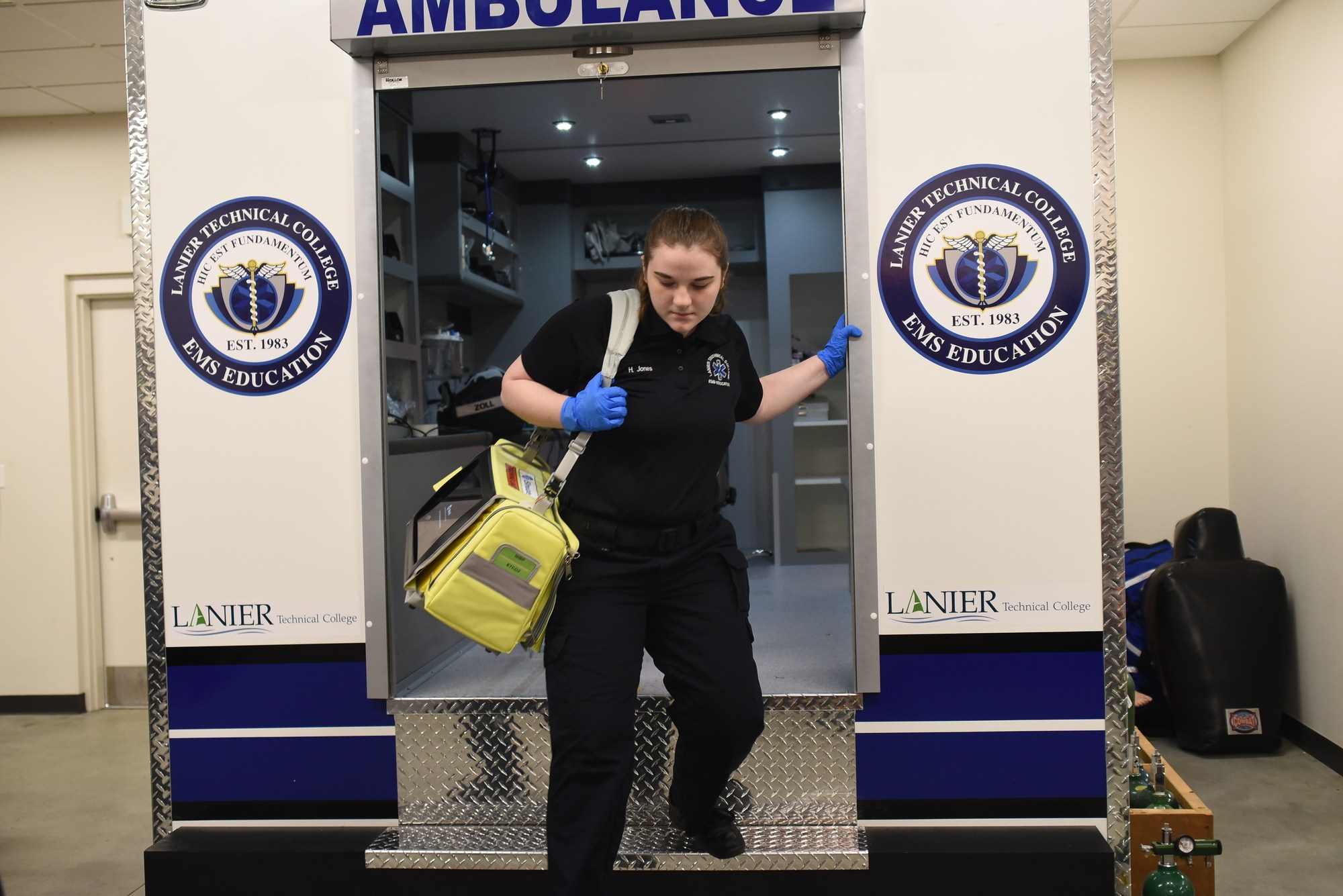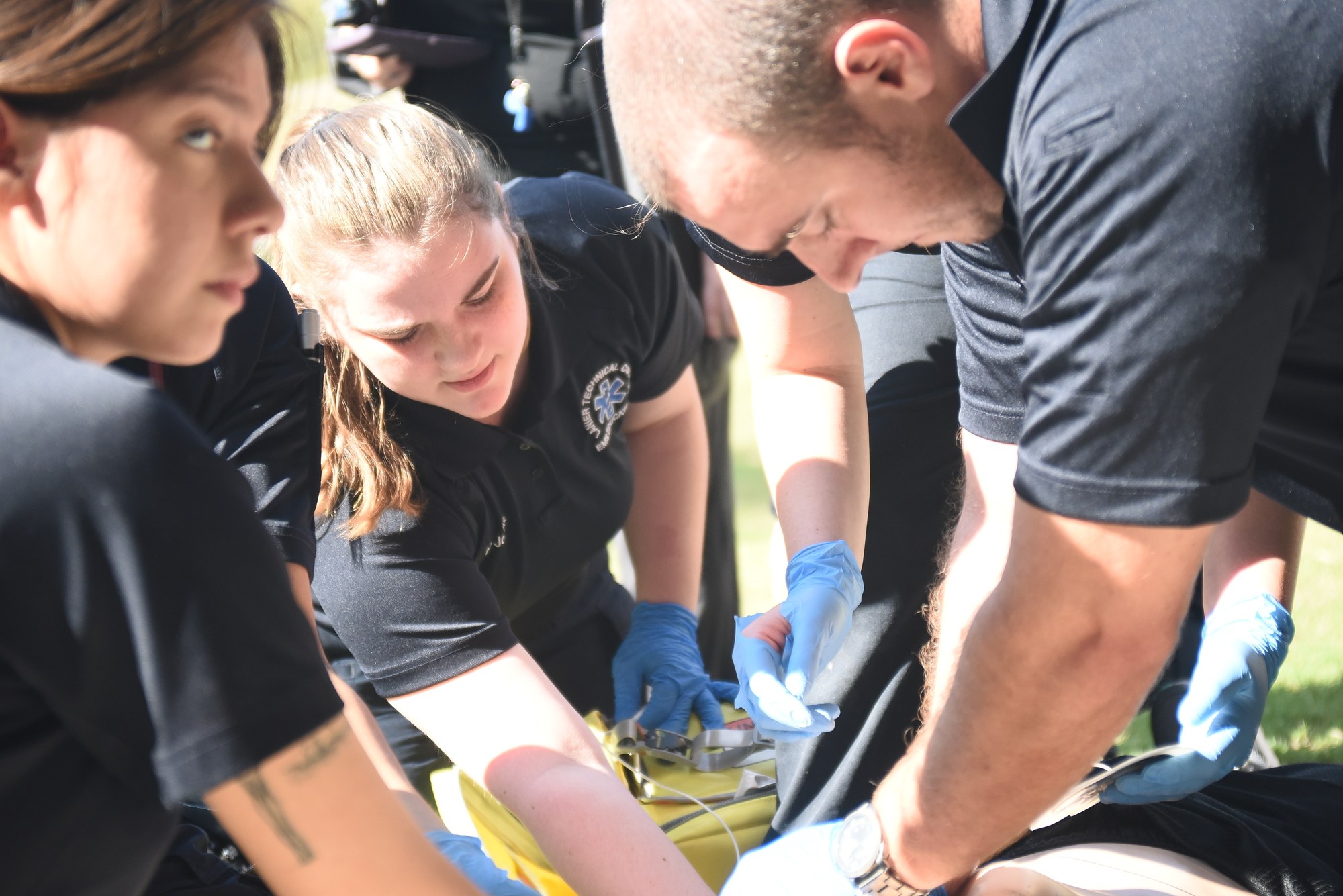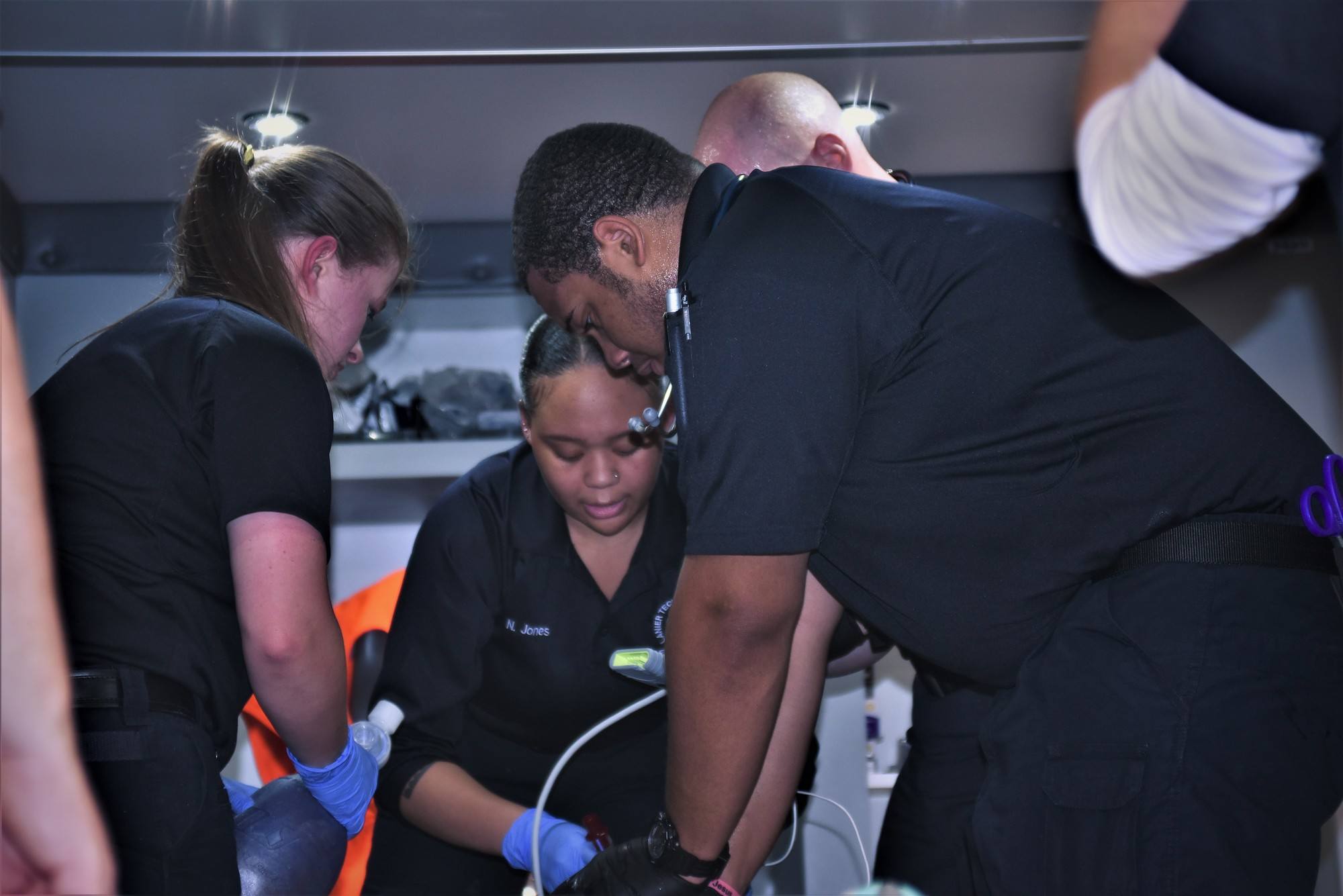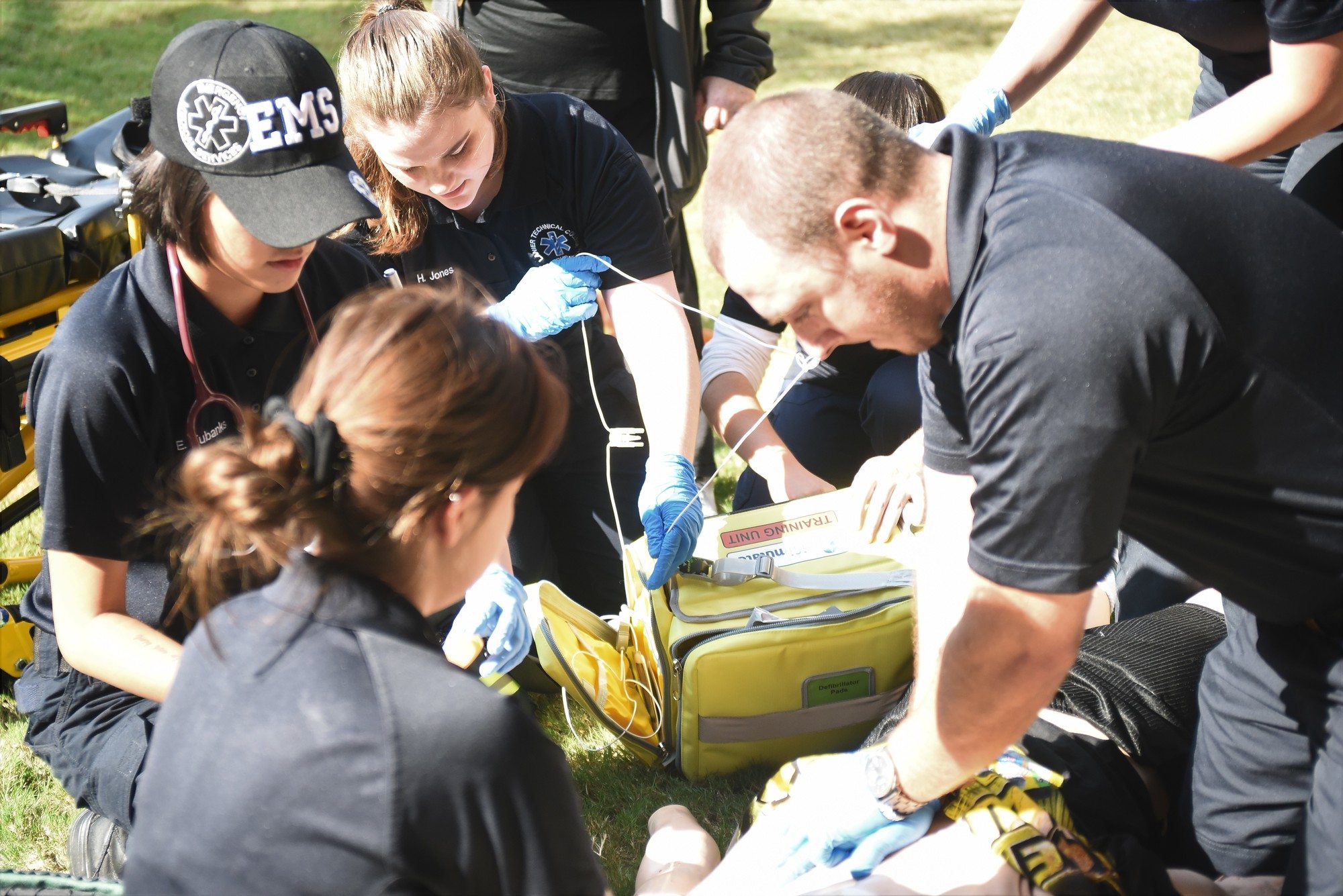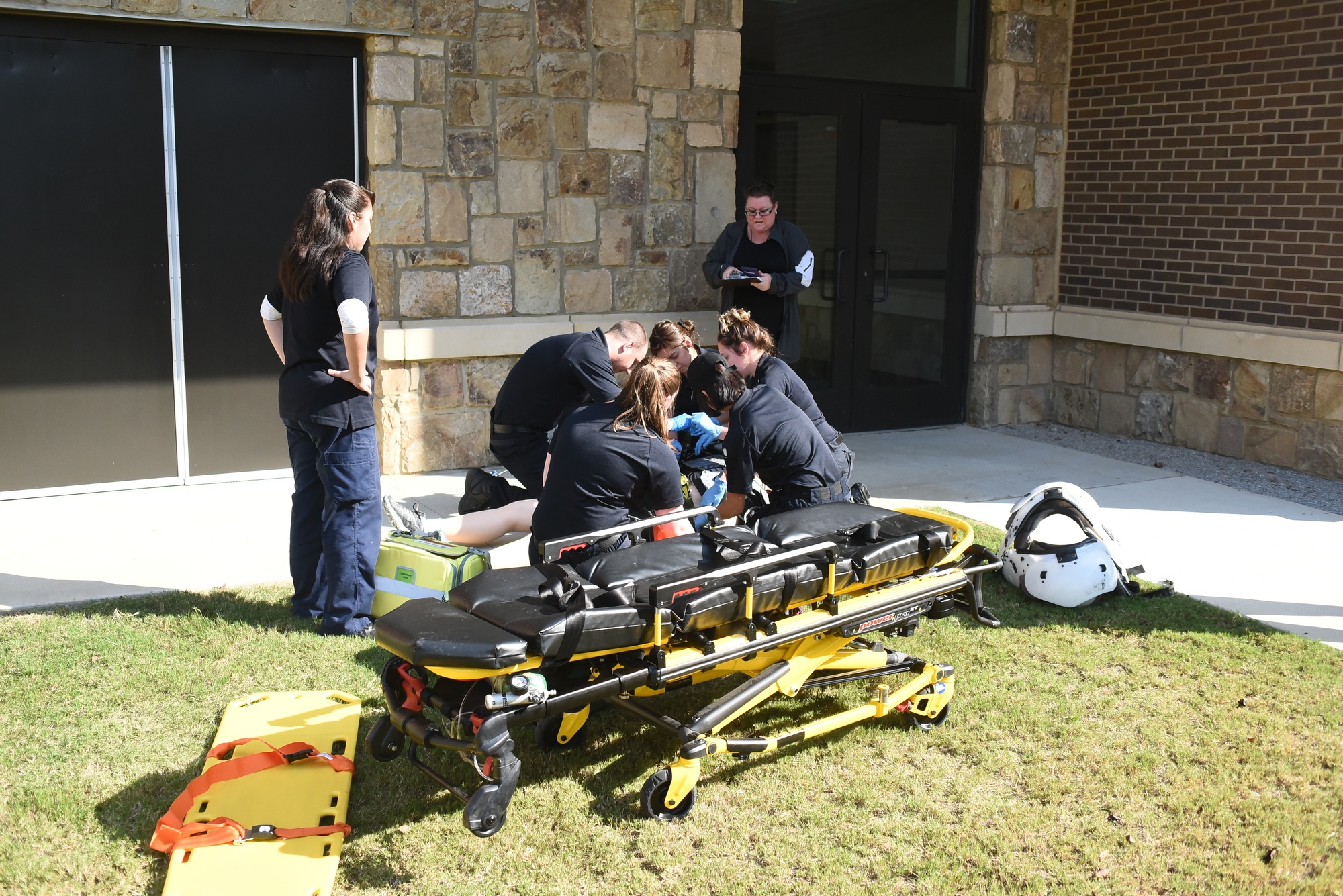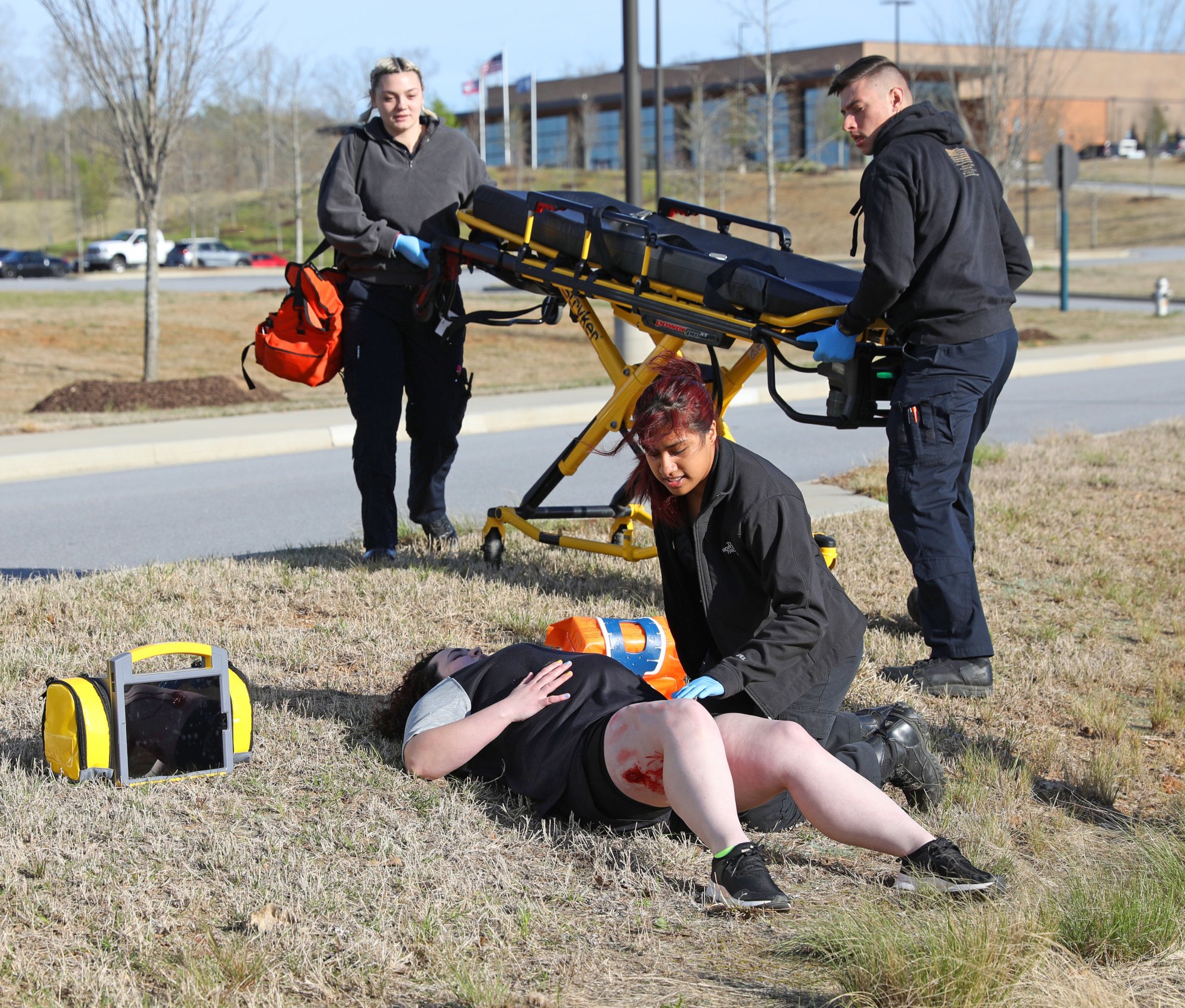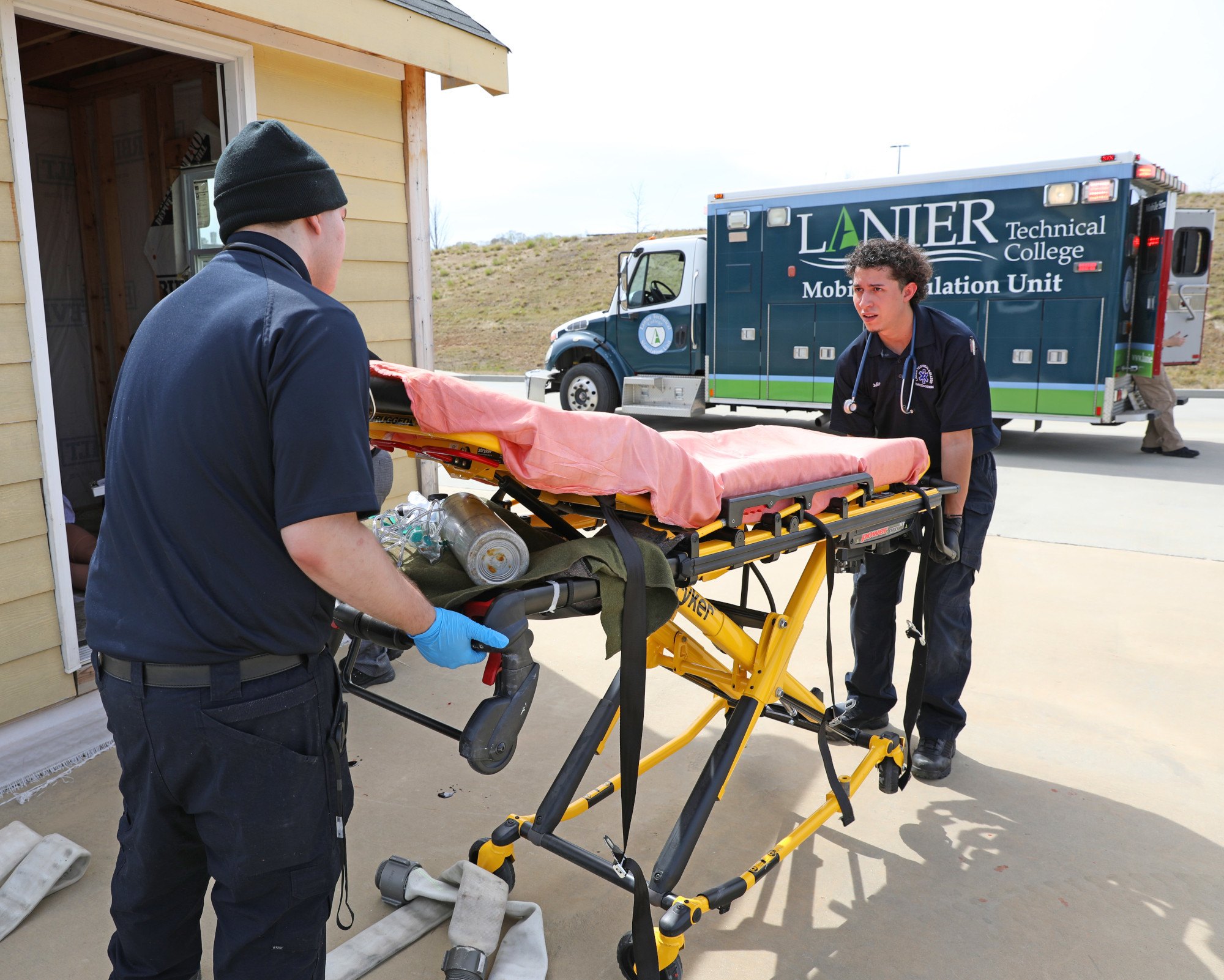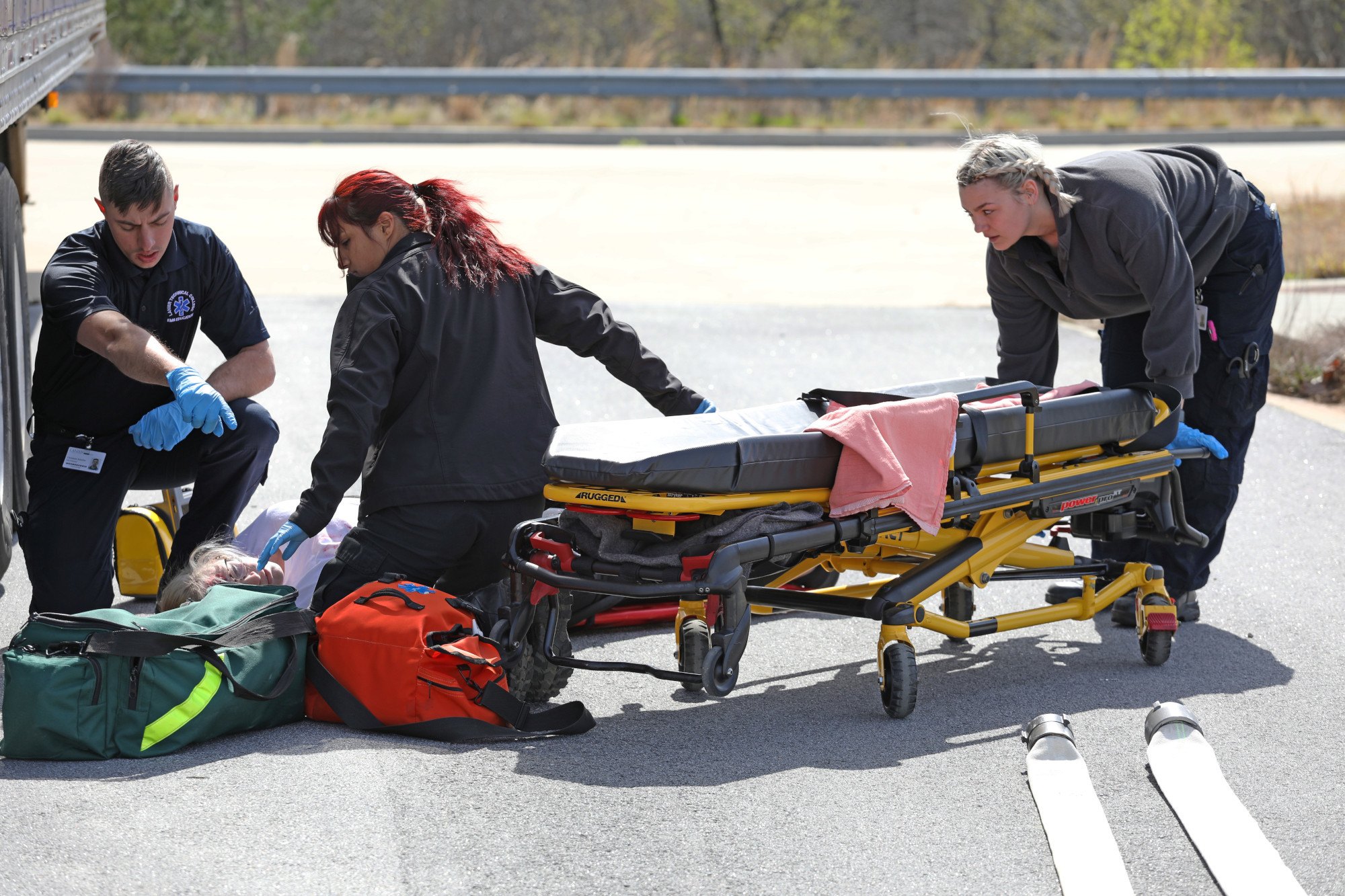EMS Education
Program Description
The Emergency Medical Technician certificate program is an entry level for the Paramedicine program. This program prepares students to provide basic emergency medical care and transportation for critical and emergent patients who access the emergency medical system. This individual possesses the basic knowledge and skills necessary to provide patient care and transportation. Emergency Medical Technicians function as part of a comprehensive EMS response, under medical oversight. Emergency Medical Technicians perform interventions with the basic equipment typically found on an ambulance. The Emergency Medical Technician is a link from the scene to the emergency health care system. Successful completion of the program allows the graduate to take the National Registry of Emergency Medical Technicians EMT certification examination and apply for Georgia licensure as an EMT.
The Advanced Emergency Medical Technician certificate program prepares students to provide basic and limited advanced emergency medical care and transportation for critical and emergent patients who access the emergency medical system. This individual possesses the basic knowledge and skills necessary to provide patient care and transportation. Advanced Emergency Medical Technicians function as part of a comprehensive EMS response, under medical oversight. Advanced Emergency Medical Technicians perform interventions with the basic and advanced equipment typically found on an ambulance. The Advanced Emergency Medical Technician is a link from the scene to the emergency health care system. Successful completion of the program allows the graduate to take the National Registry of Emergency Medical Technicians AEMT certification examination and apply for Georgia licensure as an AEMT.
The EMS Professions diploma is an entry level for the Paramedicine program. Upon completion of the EMS Professions diploma, students will also earn the Emergency Medical Technician and Advanced Emergency Medical Technician certificates, and will be able to fluidly move into the paramedicine program at the diploma level. Successful completion of the program allows the graduate to take the National Registry of Emergency Medical Technicians AEMT certification examination and to apply for Georgia licensure as an AEMT. The primary focus of the Advanced Emergency Medical Technician is to provide basic and advanced emergency medical care and transportation for critical and emergent patients who access the emergency medical system. This individual possesses the basic knowledge and skills necessary to provide patient care and transportation. Advanced Emergency Medical Technicians function as part of a comprehensive EMS response, under medical oversight. Advanced Emergency Medical Technicians perform interventions with the basic and advanced equipment typically found on an ambulance. The AEMT is a link from the scene to the emergency health care system.
The Paramedicine diploma program prepares students to provide advanced emergency medical care for critical and emergent patients who access the emergency medical system. This individual possesses the complex knowledge and skills necessary to provide patient care and transportation. Paramedics function as part of a comprehensive EMS response, under medical oversight. Paramedics perform interventions with the basic and advanced equipment typically found on an ambulance. The Paramedic is a link from the scene into the health care system. The Paramedicine diploma program prepares students for employment in paramedic positions in today’s health services field. The Paramedic diploma program provides learning opportunities that introduce, develop, and reinforce academic and occupational knowledge, skills, and attitudes required for job acquisition, retention, and advancement. The program provides opportunities to upgrade present knowledge and skills from the EMT/EMT-I 1985/AEMT levels to a paramedic level. Successful completion of the program allows the graduate to take the National Registry of Emergency Medical Technicians Paramedic certification examination and apply for Georgia licensure as a paramedic.
The Paramedicine program prepares students for employment in paramedic positions in today’s health services field. The program provides learning opportunities that introduce, develop, and reinforce academic and occupational knowledge, skills, and attitudes required for job acquisition, retention, and advancement and provides opportunities to upgrade present knowledge and skills from the EMT/AEMT level to the paramedic level.
ALL Programs require prior to beginning clinical/internship courses, students must order and pay for a background check and meet background check screening requirements as required by the clinical facility. Cost is approximately $100. The EMT programs require an orientation and a review of education, work experience, and credentials.
The paramedic program was established at Lanier Tech in 1983 and has developed clinical partnerships with nine of the areas EMS agencies, Northeast Georgia Health Systems, The Longstreet Clinic and Northside Hospital System. The clinical opportunities provided to students are both extensive and rewarding and allow the graduates to feel confident in their new roles as an EMT/AEMT to paramedic. The program has experienced staff and utilizes many guest speakers who are subject matter experts to provide a solid academic foundation, and the laboratory equipment allows students for extensive opportunities to reinforce their knowledge. The medical director is a board certified emergency physician with over 5 years of clinical practice. He is currently serving as the Region 2 EMS medical director and has involvement with the student’s education both in the classroom and in clinical settings.
The program has had a 100% pass rate on licensure exams since its inception in 1983 and since National Registry of EMT’s inception in 2009, has had a 100% first time pass rate on both written and practical exams. Over 250 students having tested since that time. It has had a 100% positive placement rate and currently the three-year average retention rate is 70%.
Campuses Offered
- Hall
Program Paths
- Degree Level:
- Diploma Level:
- Certificate Level:
Program Advisors
Paramedic National Registry Pass Rate
| Enrollment Year | Total # of Students Enrolled in the Paramedic Program | Total # of Students Completing Program | Attrition Due to Non-Academic Reasons | Attrition Due to Academic Reasons | % Retention | Positive Placement | National Registry Paramedic Written Exam (1st Attempt) | National Registry Paramedic Practical Exam |
|---|---|---|---|---|---|---|---|---|
| 2024-2025 | 46 | *** | *** | *** | *** | *** | *** | *** |
| 2022-2023 | 29 | 23 | 4 | 2 | 79% | 100% | 100% | 100% |
| 2021-2022 | 17 | 10 | 4 | 3 | 59% | 100% | 100% | 100% |
| 2020-2021 | 25 | 18 | 4 | 3 | 72% | 100% | 100% | 100% |
| 2019-2020 | 36 | 32 | 2 | 2 | 89% | 100% | 100% | 100% |
| 2017-2018 | 15 | 9 | 1 | 5 | 53% | 100% | 100% | 100% |
| 2016-2017 | 28 | 23 | 2 | 3 | 78.3% | 100% | 100% | 100% |
| *** Current Class Graduates | ||||||||
AEMT National Registry Pass Rate
| Year Attempted | Attempted The Exam | First Attempt Pass | Cumulative Pass Within 3 Attempts | Cumulative Pass Within 6 Attempts | Failed All 6 Attempts | Eligible for Retest | Did Not Complete Within 2 Years |
|---|---|---|---|---|---|---|---|
| 2024 | *** | *** | *** | *** | *** | *** | *** |
| 2023 | 15 | 53% (8) | 60% (9) | 0 | 0 | 5 | 0 |
| 2022 | 22 | 73% | 78% | 82% | 0% | 0 | 0 |
| 2021 | 22 | 68% | 82% | 82% | 0% | 18% | 0% |
| 2020 | 12 | 42% (5) | 58% (7) | 58% (7) | 0% (0) | 42% (5) | 0% (0) |
| 2019 | 36 | 56% (20) | 78% (28) | 86% (31) | 3% (1) | 11% (4) | 0% (0) |
| 2018 | 57 | 75% (43) | 93% (53) | 98% (56) | 0% (0) | 2% (1) | 0% (0) |
| 2017 | 42 | 74% (31) | 86% (36) | 90% (38) | 0% (0) | 0% (0) | 10% (4) |
| 2016 | 19 | 68% (13) | 79% (15) | 84% (16) | 0% (0) | 0% (0) | 16% (3) |
EMT National Registry Pass Rate
| Year Attempted | Attempted The Exam | First Attempt Pass | Cumulative Pass Within 3 Attempts | Cumulative Pass Within 6 Attempts | Failed All 6 Attempts | Eligible for Retest | Did Not Complete Within 2 Years |
|---|---|---|---|---|---|---|---|
| 2024 | *** | *** | *** | *** | *** | *** | *** |
| 2023 | 16 | 88% (14) | 88% (14) | 88% (14) | 0% (0) | 12% (2) | 0% (0) |
| 2022 | 13 | 100% (13) | 100% (13) | 100% (13) | 0% (0) | 0% (0) | 0% (0) |
| 2021 | 17 | 94% (16) | 100% (17) | 100% (17) | 0% (0) | 0% (0) | 0% (0) |
| 2020 | 44 | 70% (31) | 89% (39) | 89% (39) | 0% (0) | 11% (5) | 0% (0) |
| 2019 | 43 | 95% (41) | 98% (42) | 98% (42) | 0% (0) | 2% (1) | 0% (0) |
| 2018 | 57 | 95% (54) | 98% (56) | 98% (56) | 0% (0) | 0% (0) | 2% (1) |
| 2017 | 38 | 97% (37) | 97% (37) | 97% (37) | 0% (0) | 0% (0) | 3% (1) |
| 2016 | 23 | 78% (18) | 91% (21) | 91% (21) | 0% (0) | 0% (0) | 9% (2) |
New Student Information
Spring Semester 2026 – EMT will only be accepting 30 students – Hall Campus
Spring Semester 2026 – Paramedic will only be accepting 30 students to be an EMT by the start of the Program – Hall Campus *must attend mandatory cohort orientation*
Fall Semester 2026 – AEMT will be only accepting 25 students – Hall Campus – *All AEMT students must complete a mandatory exam before the start of the AEMT program*
EMT One Semester Program Starting in Spring of 2026
Lanier Technical College EMS Education did not hold a paramedic cohort of the year of 2019.
Accreditation
